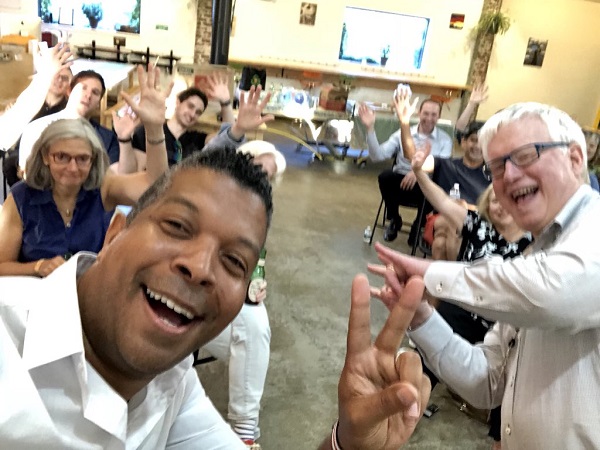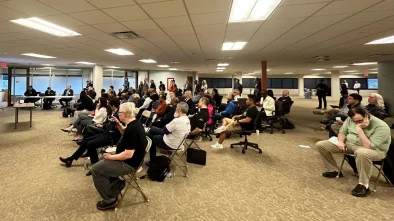After $2.5 Million Raise, Futurestay Faces Covid-19 Travel Shutdown and Prevails
It’s no surprise that the travel industry has taken a disproportionate hit from the COVID-19 economic crisis, as people sheltered in place.
So it was inevitable that New Jersey travel technology startup Futurestay (New Brunswick), led by S. Philip Kennard and Jonathan Fabio, saw business screech to a near halt in April and May.
What was amazing about this was that the cofounders had secured $2.5 million in venture funding in mid-March, when the handwriting was already on the wall.
The round was led by Brand New Matter and New York Angels, with participation from Newark Venture Partners and Harvard Business School Alumni Angels. The startup had been through two previous funding rounds.
Kennard spoke to Startup Grind Princeton organizer David Stengle at the end of May to discuss Futurestay’s business and what the cofounders had learned during this unprecedented time.
Lifelong Technology Entrepreneur
A “lifelong technology entrepreneur,” Kennard launched Futurestay with Fabio in 2014. The company provides a dashboard for people who own vacation rentals to list them on national platforms and control their properties, no matter where they are listed online. “We focus on the small-business portion of the business, which makes up about 70 percent of inventory,” Kennard said. The total market is $200 billion, he stated.
The founders began their latest fundraising effort well before the pandemic struck, Kennard noted. They had “some irons in the fire in the middle of Q2 last year,” and they started making significant progress around the most recent raise towards the end of last year. However, the deal did not close until after the pandemic had struck internationally, in March. Kennard remembers it distinctly. It was the day after the NBA had shut down.
Kennard remembers going out to dinner with his lead investors and his board of advisers in New York at a normally overbooked restaurant, and finding that they had no trouble getting a table at the last minute. Nearly everyone else had canceled their reservations.
Timing is everything, Kennard acknowledged, adding that they were “blessed to start fundraising when they did and close when they did.”
Stengle asked Kennard how he handled telling his investors that his business would be severely affected as travel began to be shut down. The founders were open and honest about that, sending an emergency update to investors, Kennard said.
“A golden rule of being able to raise capital is being transparent and communicative with investors. Your investors don’t want to rake you over the fire. They want your business to succeed.”Philip Kennard, Futurestay
“A golden rule of being able to raise capital is being transparent and communicative with investors. Your investors don’t want to rake you over the fire. They want your business to succeed, which is why they invested in it and, more often than not, at an earlier or an early growth stage. …They want to roll up their sleeves and make intros and give feedback and so on.”
Trying to stay optimistic in the face of a macroeconomic event wouldn’t have been particularly helpful, Kennard pointed out. The cofounders reported that Futurestay was seeing travel shut down worldwide and its booking volume slow to a grind. They told the investors that they didn’t have a future outlook yet, but that they would keep them posted.”
Of course, the cofounders took other measures. They cut their budget by 10 percent. They established a hiring freeze and did not replace one staff member who was transitioning out. They cut outbound sales for the time being and refocused on long-term or medium-term goals.
Refocusing on Strategic Goals
If there was a silver lining to the business slowdown, it was that the founders could refocus their thinking, and instead take stock of the long-term goals of the company. As Kennard explained, startup founders are often too busy delivering on what they promised to customers and investors, and can rarely take high-level strategic looks at their overall businesses.
“It forces you to go into a strategic mindset; there’s really no choice. I knew there is nothing that I can do right now to make people book more travel. I don’t sell travel. I connect properties and travel. So, I can continue getting properties connected with what we’re doing, and we can continue building partnerships, and that’s what we are doing.”
Using an analogy, Kennard said, “You can think about it as which levers you can pull. …My revenue lever is turned off … but my growth levers, my partnership levers, my business-process levers, my investor-relationship levers and so on are active, and I have more resources to pull them right now.”
Switching to Remote Work
One of the hardest parts of the economic shutdown for Futurestay has been switching to remote work. “I was the CEO archetype that wanted everyone in the office for work. Although we were a relatively small company of 20 people worldwide,” even the teams in other countries had offices.
“That wasn’t to waste money. It was because we wanted to make sure the ability to collaborate in real time was a natural part of the workday. And we wanted to give team members around the world, including our team here in the Jersey office, what felt like a home base and what felt like more of a sense of belonging. Culture was always a really tremendously important for the Futurestay team.”
The startup is still building a collaborative support system remotely, to make people comfortable in their surroundings, he said, whether that means dropping off masks to people or getting them groceries when they were in a nondelivery area. They’ve sent care packages across the ocean and across the country.
Futurestay is still working on getting its remote meetings right. “We built a better meeting cadence and a better project-management structure” that will hopefully hold up for the long term. Getting brainstorming meetings going has been challenging for the startup, which is used to working with a white board, with everyone contributing. They are using Slack and other tools, but haven’t completely mastered collaborative communication remotely, said Kennard.
At the end of the talk, NJTechWeekly.com asked Kennard what was keeping him up at night. While he can still build relationships and partnerships during COVID-19, the threat of a second wave that would cause further shutdowns and damage to the travel industry weighs heavily on his mind. It could put the company in a position where it would have to raise money in an unfavorable environment, as the metrics most investors want to see aren’t moving upward. And it would be extremely challenging, he said.
Kennard believes that his business will return, and he’s seen some evidence of that, as people are now booking short-term rentals within several hundred driving miles of their homes. They want to get away, but safely. And that’s good for Futurestay.




